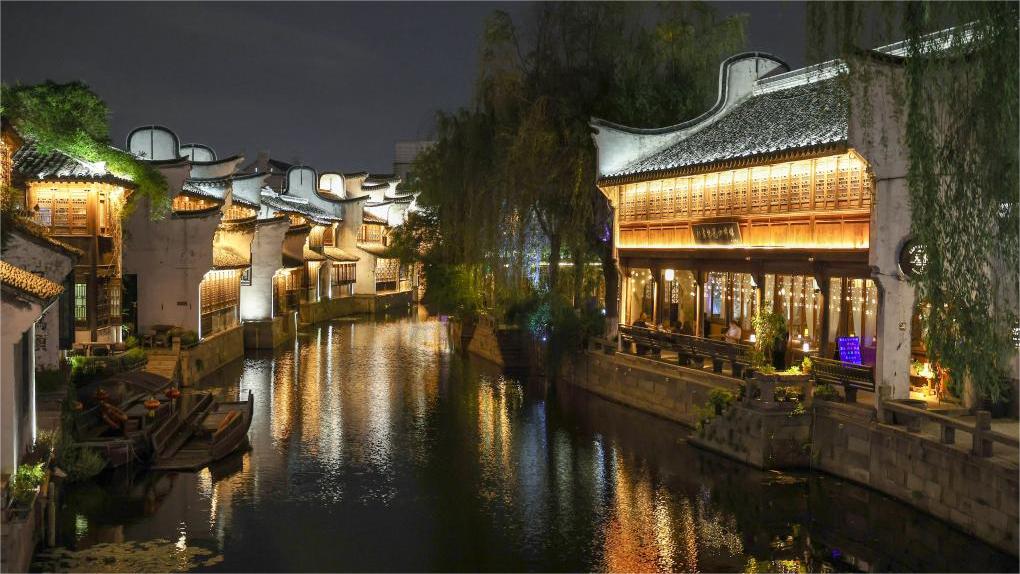Unmanned "plant factory": production line of vegetables

A technician checks on the growth of plants. (Photo provided by the Science and Technology Department of Sichuan Province)
Can plants grow without soil and sunshine? The answer might be found in a "plant factory" at the Chengdu National Modern Agricultural Industry Science and Technology Innovation Center in Chengdu, southwest China's Sichuan province.
In the plant factory, lettuce plants grow on multi-tier steel racks, bathing the red and blue rays emitted from LED lights fitted at the top of the racks. The factory, with a pinkish glow coming out of its glass walls, exactly resembles a scene in a sci-fi movie.
"Vegetable growing has its 'production line,' too. A lettuce can mature in just 35 days after the seed is sown if it's provided with proper nutrients, lighting and temperature. It would take at least twice as long in an open field," said Yang Qichang, pointing to the 20-tier facility.
As the chief scientist of the Institute of Urban Agriculture, Chinese Academy of Agricultural Sciences, Yang and his team have been dedicated to the plant factory for nearly 20 years.
The plant factory runs this way. A computer commands robotic arms to plant lettuce seedlings onto plates, and then the plates are sent to designated tiers of the racks, where the seedlings receive lighting and nutrient solutions. When the lettuce plants mature, they are withdrawn from the racks and packed after their roots are cut off. Thanks to intelligent management and assistive robots, the plant factory is completely unattended, from seeding to harvesting, and to packing.

Photo shows the interior of the unmanned vertical plant factory. (Photo provided by Chengdu Media Group)
Traditional agriculture often faces reduced yields due to meteorological disasters, pests and plant diseases. It's always difficult to maintain a sound environment for crops. Greenhouse cultivation is an exploration that allows for the cultivation of off-season vegetables, but it is still susceptible to adverse weather conditions such as high temperatures and snow.
Plant factories have shattered the constraints of natural conditions. As an efficient agricultural system that achieves year-round continuous crop production through precise control in a closed environment, a plant factory can adjust environmental factors such as light, temperature, humidity, and nutrients in real-time according to the specific requirements of different crops. This precise supply enables high-efficiency production.
Additionally, plant factories can induce flowering and promote rapid growth, significantly shortening crops' growth cycle.
Plant factories feature accelerated growth of crops, said Wang Sen, a researcher with the Institute of Urban Agriculture. This type of facility, which is free from the limitations by land, space, and climate conditions, accelerates the growth of crops through a light-nutrient coupling technique. It can shorten the growth period of crops such as rice, wheat, corn, soybeans, cotton, and rapeseed by more than half, providing effective support for accelerating crop breeding.
It's important to improve lighting efficiency and lower energy consumption when building a plant factory. Wang told People's Daily that his team has established a database containing 1,238 "lighting solutions" for 72 crop varieties in five major categories, which helps adjust lighting plans based on crop varieties and stages of growth.

The plant factory is completely unattended, from seeding to harvesting, and to packing. (Photo provided by Chengdu Media Group)
Besides, with the application of the light-temperature coupling technology, the plant factory's overall energy consumption has been lowered by over 56 percent.
To address the issues of low land utilization and spatial efficiency in traditional flat planting, the team adopted vertical cultivation techniques. "This 20-tier vertical farm can increase land utilization by over 120 times," Yang disclosed.
Today, the 200-square-meter plant factory produces over 60 tons of vegetables each year. By adopting self-developed new crop varieties, vertical cultivation systems, automatic nutrient solution supply systems, energy-saving artificial light sources, and AI-based intelligent management systems, the vertical farm has achieved year-round stable food production.
The team is currently exploring profitable business models for the plant factory. It is learned that the high-end leafy vegetables grown in the plant factory target densely populated urban areas such as the Beijing-Tianjin-Hebei region and the Yangtze River Delta, as well as regions with a local vegetable self-sufficiency rate below 10 percent. Furthermore, the plant factory can also be used for intensive seedling cultivation, which not only reduces production costs but also ensures seedling quality.
China's plant factories are going international. During an international plant factory technology training program hosted by China, students from over 20 countries received systematic training on plant factories. LED "lighting solutions" have been promoted in more than 100 countries and regions. China has also reached agreements with the United Kingdom, Saudi Arabia, Chile and Qatar to build vertical plant factories.
Photos
Related Stories
- Agricultural technologies contribute to tomato planting in Shouguang, "China's Hometown of Vegetables"
- Planting technologies, methods from Shouguang empower vegetable greenhouses in S China's Guangxi
- 24th China (Shouguang) Int'l Vegetable Sci-Tech Fair kicks off
- Production of green pepper seedlings in full swing in county in N China's Shanxi
- China's vegetable exports increase in 2022
Copyright © 2024 People's Daily Online. All Rights Reserved.









